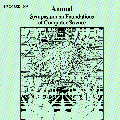In distributed differential privacy, the parties perform analysis over their joint data while preserving the privacy for both datasets. Interestingly, for a few fundamental two-party functions such as inner product and Hamming distance, the accuracy of the distributed solution lags way behind what is achievable in the client-server setting. McGregor, Mironov, Pitassi, Reingold, Talwar, and Vadhan [FOCS '10] proved that this gap is inherent, showing upper bounds on the accuracy of (any) distributed solution for these functions. These limitations can be bypassed when settling for computational differential privacy, where the data is differentially private only in the eyes of a computationally bounded observer, using public-key cryptography primitives. We prove that the use of public-key cryptography is necessary for bypassing the limitation of McGregor et al., showing that a non-trivial solution for the inner-product, or the Hamming distance, implies the existence of a key-agreement protocol. Our bound implies a combinatorial proof for the fact that non-Boolean inner product of independent (strong) Santha-Vazirani sources is a good condenser. We obtain our main result by showing that the inner-product of a (single, strong) SV source with a uniformly random seed is a good condenser, even when the seed and source are dependent.
翻译:在分布式的隐私中,各方对其联合数据进行了分析,同时保留了这两个数据集的隐私。有趣的是,对于内部产品和Hamming距离等几个基本的两方功能,分布式解决方案的准确性远远落后于客户服务器设置中可以实现的。 McGregor、Mironov、Pitassi、Reingold、Talwar和Vadhan[FOCS'10]证明了这一差距是内在的,显示了这些功能分配式解决方案的准确性(任何)的上限。在解决计算式差异隐私时,这些限制可以被绕过,因为数据只在计算式封闭的观察者眼中以不同的私性为特点,使用公共钥匙加密的解决方案的准确性远远落后于客户服务器设置中可以实现的准确性。 我们证明,使用公用钥匙加密的密码法是绕过Mcgregregorgororgors, 或Hamming 距离意味着存在一个关键协议的任意性证据。我们的约束意味着,即使非Boolean 内部产品在计算上也是一种坚固的种子核心产品,我们内部的源(坚固的) 也是我们获得一个坚固的精密的精密的内源。



